
News |
- Pipelines New Review Principles Still Not Enough
- Regional Chiefs To Trudeau - Fix The NEB
- Court Rules B.C. Government Failed To Consult First Nations
- Site C Dam Protests Heating Up
- Manitoba & Alberta Sign Climate MOU
- COP 21 Paris Agreement Makes History
- National Energy Board Moves Towards Transparency
- Mount Polley Mine Reopens
- Paris Climate Talks 2015 - Week One Ends
- Manitoba Climate All Talk No Green
- NEB Must Understand Aboriginal Elders
- Protect Parks From Mining
| Pipelines New Review Principles Still Not Enough | 30 January 16 |
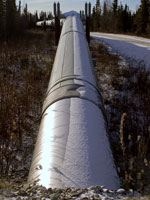
Canada's environmental assessment processes are badly broken. By setting out broad expectations that resource projects will have to meet, the government has begun the process of earning public and stakeholder confidence in the process. It is vital that the Canadian government include all greenhouse gas emissions (upstream and downstream) in its assessment of major energy proposals like the Energy East pipeline and the Trans Mountain expansion. It is not yet clear what criteria Cabinet will use to determine the acceptable level of emissions from each project. Clarity on what is and is not acceptable in energy development in Canada is the first step in diversifying the country's resource economy and ensuring a fair, smooth transition for people who work in the fossil fuel industries. Clean energy already produces more direct employment in Canada than the tar sands, even before falling oil prices set off layoffs in the Alberta oil patch. Canada committed to efforts to limit global warming at last month's Paris climate conference, noted John Bennett, with Friends of the Earth in Ottawa. "You can't say you're committed to keeping emissions below 1.5 degrees, and then not count downstream emissions when you're assessing the project," Bennett said. "They're trying to fool themselves or Canadians that we can deal with climate change, and not deal with the fact that we're pumping fossil fuels out of the ground." Bennett said if the Liberals hoped this announcement would achieve "pipeline peace," they're wrong.
View January 29, 2016 National Observer article |
|
 Print version Print version |
Top |
| Regional Chiefs To Trudeau - Fix The NEB | 30 January 16 |
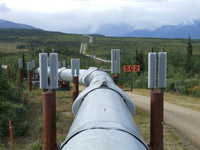
"First Nations and Canada have a lot of work to do regarding measures needed to finally put us all on the path of reconciliation and partnership. We focus here on one such measure - the overhaul of the review and assessment process for Tar Sands export pipelines. The current system, a product of the unconstitutional Omnibus Bills C-38 and C-45 which First Nations vigorously opposed, has: recklessly compressed pipeline reviews; sidelined critics; excluded essential considerations such as climate change; and violated Indigenous rights and sovereignty. Meanwhile, the National Energy Board (NEB) is no longer an independent arbiter in such reviews. It has become a politicized and industry-captured 'rubber stamper' that pays only lip service to the respect for the positions and rights of First Nations. All of these changes unravel opportunities for First Nations who are directly impacted by regulators like the NEB to offer them and industry vitally important information about the lands and resources. The current restrictions further damage the relationship with First Nations and undermine the public trust, legitimacy and openness of the federal environmental assessment process. In light of your Government's stated positions in respect to such matters, our First Nations in British Columbia, Manitoba and Quebec call for the establishment of a new pipeline review and assessment process, to be developed and implemented in collaboration with First Nations, that will enable a thorough and objective environmental assessment of these pipelines that respects our rights under the Constitution of Canada as well as under the United Nations Declaration on the Rights of Indigenous Peoples. Before proceeding with such desperately needed reforms, however, we insist on the immediate cancellation of the NEB review processes for Kinder Morgan's Trans Mountain, Enbridge's Line 3 and TransCanada's Energy East Tar Sands pipelines. Such reviews will need to be completely re-thought in line with the above reforms to be established collaboratively by First Nations and Canada. We are encouraged that Liberal MP Terry Beech, Burnaby North-Seymour, has already said there will be no decision on Kinder Morgan in January, and that Kinder Morgan will have to go through a new, revised process."
View January 29, 2016 Ricochet article |
|
 Print version Print version |
Top |
| Court Rules B.C. Government Failed To Consult First Nations | 15 January 16 |

The ruling, which is a major victory for the Gitga'at First Nation, means the equivalency agreement is invalid, that the government must now make its own environmental assessment decision regarding the Enbridge Northern Gateway pipeline, and that it must consult with and accommodate First Nations along the pipeline route about potential impacts to their Aboriginal rights and title. "The province has been talking a lot about its opposition to oil pipelines in recent days," said Art Sterritt, a member of the Gitga'at First Nation. "Now it must put its money where its mouth is and apply the same rigorous standards it advocated for during the Joint Review Panel process, while consulting with every single First Nation who would be affected by this project. We've said it before: The Enbridge Northern Gateway pipeline is dead." The ruling means that, until the province makes a decision on the Enbridge Northern Gateway pipeline and issues an Environmental Assessment Certificate, none of the approximately 60 permits, licenses and authorizations necessary for the project to proceed can be issued. "Consultation does not mean explaining, however fulsome, however respectfully, what actions the government is going to take that may or may not ameliorate potential adverse effects," Justice Koenigsberg wrote. "Such a means of dealing with the admittedly difficult issue looks very like 'we know best and have your best interests at heart'. First Nations, based on past experience, quite rightly are distrustful and offended at such an approach."
View January 14, 2016 CBC News article |
|
 Print version Print version |
Top |
| Site C Dam Protests Heating Up | 15 January 16 |
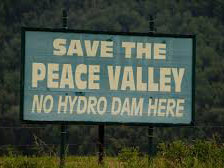
"We have a peaceful protest camp," Yvonne Tupper, a Saulteau First Nation woman from Chetwynd, told CBC News. "Site C is infringing our treaty rights. No Treaty 8 First Nation has ever given consent prior to construction. And it's an insult and an assault to continue construction while there are pending court cases. " Site C dam, the third on the Peace River in British Columbia, will create an 83-kilometre-long reservoir and flood an area where protesters are currently camping. It has long been a controversial debate in the region and has been opposed for years, prompting legal challenges by several groups concerned about the impact a new lake created by the dam will have on the Peace River area. Environmental activist David Suzuki is throwing his support behind First Nations protesting the construction of the $9-billion Site C dam in northeastern British Columbia. Suzuki and the grand chief of the Union of B.C. Indian Chiefs, Stewart Phillip, travelled to the remote Rocky Mountain Fort Camp in the Peace Valley on Tuesday morning. Suzuki said he made the trip to thank the protestors for continuing the fight against the dam. "I wanted to go and thank them ... because I was one of many, many people 30 years ago that was opposing the dam at Site C — exactly the same dam and we won that one," he said. So I can't figure out what the hell — we already had this battle before and we're having it again." Meanwhile, Grand Chief Phillip says he is infuriated by what he called a "provocative and aggressive approach" from BC Hydro and the province. "It is absolutely unacceptable that BC Hydro is relentlessly clear-cutting forests right now to prepare for the flooding of the Peace River Valley, which will destroy archaeological sites and eradicate prime farmland," said Phillip.
View January 13, 2016 Aboriginal Peoples Television Network article |
|
 Print version Print version |
Top |
| Manitoba & Alberta Sign Climate MOU | 15 January 16 |
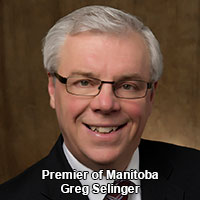
The premiers discussed climate change and energy infrastructure. They say Alberta's and Manitoba's actions and leadership on climate change have advanced the national dialogue on important infrastructure projects such as hydroelectricity transmission and pipelines. The premiers agreed that Canada's energy infrastructure must be built in an environmentally responsible and safe way. The two premiers signed a Memorandum Of Understanding (MOU) that, in broad terms, commits their provinces to further emissions reductions and energy efficiency. The MOU includes a commitment to share information and develop co-operative measures related to energy conservations programs, renewable energy development and greenhouse-gas reduction policies. It also emphasizes the importance of improving integration of electrical grids in western Canada to open up economic opportunities, improve energy reliability and resiliency, and continue transition to a lower-carbon economy. Building sizable transmission capacity to Alberta would be a long-term and costly project. Provinces have previously pressed the federal government, without success, for help in funding a national east-west grid. Both premiers support Energy East, which is not going to reduce emissions. Both provinces' emissions are rising. And a comparison of their new climate plans does not favour Manitoba's climate plan.
View January 8, 2016 Alberta Government article |
|
 Print version Print version |
Top |
| COP 21 Paris Agreement Makes History | 14 December 15 |

As part of a concerted effort to avoid catastrophic climate change, the world's governments unanimously committed to an ongoing effort of increasingly deeper emissions reductions aimed at keeping total warming "to well below 2°C [3.6°F] above preindustrial levels." The full text of this Paris Agreement goes even further, with the parties agreeing "to pursue efforts to limit the temperature increase to 1.5°C above preindustrial levels, recognizing that this would significantly reduce the risks and impacts of climate change." "Canada has reasserted itself on the world stage by playing a strong role in developing the historic Paris agreement to curb the climate threat facing us all," said Anthony Swift, Canada Project Director at NRDC. Merran Smith, executive director of Clean Energy Canada, described the Paris goal of 1.5 degrees C as "encouraging," but warned that an accelerated transition to renewable power was vital if such an ambitious deal was to succeed. "At last, a historic international agreement on climate change has been finalized. Now it's up to citizens and their governments to ensure a safe future, free from catastrophic climate impacts. And that means Canada has work to turn its strong words in Paris into actions at home," said Tim Gray, executive director of Environmental Defence. To help avoid catastrophic climate change and keep global warming within 1.5 degrees C, Gray said Canada had to roll out a new federal climate framework within the next 90 days aimed at total decarbonisation by 2050. "It sets the international framework," Christine McKenna, Canada's Environment and Climate Change minister, said. 'We need to be ambitious now in Canada too.'
View December 14, 2015 National Observer article |
|
 Print version Print version |
Top |
| National Energy Board Moves Towards Transparency | 14 December 15 |
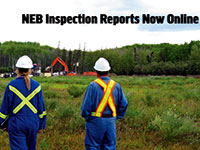
"Canadians really deserve to have this information. I think what you are looking at is a new NEB," said Darin Barter, a National Energy Board spokesperson in Calgary said of the announcement. Barter said if disclosing pipeline issues prompt Canadians to lose confidence, "I would say the companies need to step it up then." NEB Inspection reports will be available online within six weeks of the inspection taking place, so that it can be reviewed for accuracy and translated for posting in both English and French. Detailed findings, outcomes and any enforcement and compliance action taken by NEB Inspection Officers will also be posted. In recent years because of appointments of oil and gas industry professionals to the board, the NEB has been criticized as a pipeline approval machine. Independent panel members have been resigning due to the NEB's troubled proceedings for recent hearings. The summer 2015 board appointment of a Kinder Morgan consultant by the former federal government shows there is a long way to go to regain public trust.
View November 27, 2015 CBC News article |
|
 Print version Print version |
Top |
| Mount Polley Mine Reopens | 14 December 15 |
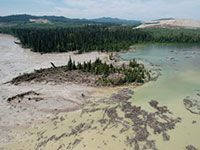
In a statement announcing the permit, the B.C. Environment Ministry said treated water will be discharged into Hazeltine Creek, flow into a pond where sediment will settle out, and from there will be piped into Quesnel Lake 30 to 40 metres below the surface. Secwepemc Nation spokesperson Kanahus Manuel is outraged by the province's decision, and worried for the people who use Quesnel Lake. "This effluent and this treated water that Imperial Metals is discharging into Quesnel Lake is not meeting the drinking water guidelines," she says. "It is going to be flowing right down into the Fraser River which 63 per cent of B.C. depends on for our watershed."
View December 2, 2015 CBC News article |
|
 Print version Print version |
Top |
| Paris Climate Talks 2015 - Week One Ends | 6 December 15 |
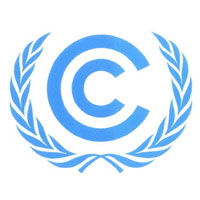
The international response to climate change began at the Rio Earth Summit in 1992, where the 'Rio Convention' included the adoption of the UN Framework on Climate Change (UNFCCC). This convention set out a framework for action aimed at stabilising atmospheric concentrations of greenhouse gases (GHGs) to avoid "dangerous anthropogenic interference with the climate system." For the first time in years of UN negotiations, the EU aims to achieve a new legally binding and universal agreement on climate at COP21 in Paris. France, as host & chair for COP 21, is responsible for delivery of a consensus agreement by December 10, 2015. Current key issues at COP 21 defining negotiations for language in a new climate agreement include civil rights, indigenous rights, the actual temperature goal to aim for, and the role of 'non parties' who do not sign a new UN agreement. These include cities, non government organizations, and sub national provinces, states, countries, etc.
Visit COP 21 website |
|
 Print version Print version |
Top |
| Manitoba Climate All Talk No Green | 6 December 15 |

Manitoba will join Ontario, Quebec and California in introducing a cap-and-trade system to reduce greenhouse gas emissions. Premier Greg Selinger unveiled plans for the cap-and-trade system, which would make big emitters of greenhouse gases pay for carbon, as part of the province's plan to battle climate change. It's the second time that Selinger's NDP government has tried to set an emissions-reduction target. In 2011, the province admitted that it failed to meet its Kyoto emissions-reduction pledge, which it had enshrined in law three years earlier. In 2008, the province passed a law to reduce greenhouse gas emissions to roughly 17,500 kilotones by 2012. However, in 2013 emissions peaked at more than 21,400 kilotones. Previously, Manitoba’s NDP government adopted the Kyoto Protocol and passed the Climate Change Emissions Reduction Act in 2008. The Act includes a public registry for emissions reductions, not yet in place.
View Manitoba Wildlands Climate Change page |
|
 Print version Print version |
Top |
| NEB Must Understand Aboriginal Elders | 27 November 15 |

The problem stems from how out of touch the NEB is with the legal weight traditional knowledge actually carries, specifically oral traditional evidence. Aboriginal Traditional oral evidence coming from ancient cultural roots and experience, an interconnected wisdom and expertise gained from millennia of living on and with the land, is as 'scientific' as it is spiritual. The traditional scientific and spiritual knowledge are indivisible in the case of traditional knowledge. Assembly of Manitoba Chiefs has formally objected to the NEB definition of traditional knowledge. The pivotal issue is Canada claiming jurisdiction over First Nation territory, arbitrarily issuing rights to third-party interests on top of First Nations rights. It is time the NEB and Canada listen to the First Nation Elders and Knowledge Keepers who know the land and who can speak to the rights of their Nations. No third party industry can claim jurisdiction or priority in Canada over First Nation rights. The current situation in Canada with the resource industry is like 'borrowing' your sisters bike then renting it out to the highest bidder – even if they destroy the bike, and never compensating your sister for wrecking her bike. NEB hearings for Enbridge Line 3 Replacement Program in Winnipeg start November 30, 2015.
View November 28, 2015 Manitoba Elders event invitation |
|
 Print version Print version |
Top |
| Protect Parks From Mining | 27 November 15 |
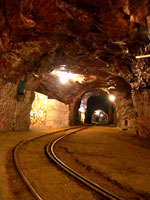
Manitoba’s new protected areas strategy focuses on small ecological reserves and wildlife management areas (WMAs). It is unclear if the Manitoba government will act to protect parks and large regions of Manitoba’s boreal forest as it has been promising for years. Old provincial parks in Manitoba were often established over old mining and logging areas, where industrial roads allowed access to beautiful landscapes filled with clear lakes and forested ridges. These same mining areas have been subject to mining exploration for decades. More recently a new mine opened in Clearwater Lake Provincial Park. Provincial parks under the new Manitoba Parks Act are to provide protection of natural lands and waters and the quality of life for Manitobans. Parks preserve biological diversity. And biodiversity in protected and fully functioning natural ecosystems mitigates our climate, provide fresh water and clean our air. The Manitoba government still allows mining companies to claim land in provincial parks. There are over 750 claims in 13 of Manitoba's provincial parks, including Whiteshell, Nopiming, and Grass River. Forestry options have been removed from most park lands.
View November 26, 2015 Manitoba Government news release |
|
 Print version Print version |
Top |


 RSS Feeds:
RSS Feeds: